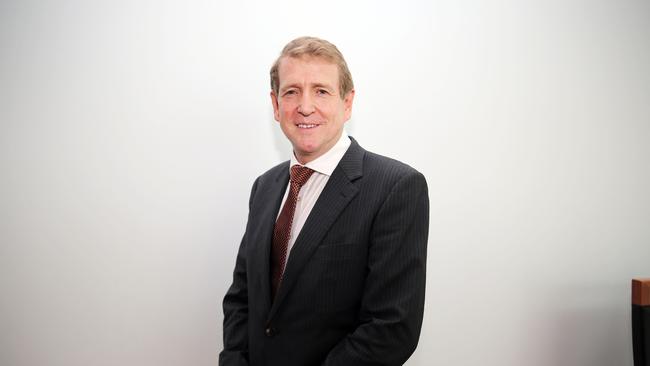
As the Liberal vote plummets across Australia, its brand suffers damage due to leadership instability, factional in-fighting and ideological confusion, and voters desert the party in droves, the Nationals believe they can quarantine themselves from the troubles of their coalition partner.
Nationals federal president Larry Anthony told this column his party is determined not to be collateral damage.
The Nationals will defend each of the party’s 16 lower-house seats as though they are by-elections, running strong, local-based campaigns that position its members as community champions.
Anthony sees a pathway to hold all seats, even if the government falls. “There is a loyalty vote for the Nationals that can inoculate us if there is a swing away from the government,” he says.
“We will run our own race. My message to the party is that you’ve got to back yourself and believe in yourself. We have a good story to tell, as a party and a government, and we need to focus on our electorates.
“We need to highlight, more adequately than we have done so far, policies that have delivered growth, jobs, tax cuts and infrastructure. We also need to focus on the alternative with Labor’s policies on capital gains tax, franking credits and industrial relations. And we need to focus locally on our communities.”
The Nationals’ internal polling — made available to this column by party sources — shows that in the Queensland seats of Capricornia (held by 0.6 per cent), Flynn (1 per cent) and Dawson (3.3 per cent), the party is just 1-2 per cent behind Labor.
The Liberal National Party had trailed significantly in these seats over the past year, and had written them off. The issues driving support back to the LNP in Queensland, where the party is seen as having a clear advantage over Labor, are the economy, employment and cost of living, and concerns over immigration and border protection.
Nevertheless, these are difficult times for the Coalition.
The Liberals are on to their third prime minister in three years. Barnaby Joyce resigned as Nationals leader after being discredited by a sex scandal. The parliamentary majority was lost when the Liberals failed to hold Malcolm Turnbull’s seat of Wentworth in a by-election.
Newspoll shows the government on track for a historic rout.
Anthony says the Nationals did suffer a dip in support among their conservative base when Joyce’s leadership imploded.
That saga went on for months as voters, and party loyalists, looked on in either horror or bemusement as the merits of a “bonk ban” were debated, and then there were the paid tell-all TV interview and the book tour.
“It was very turbulent for the party and traumatic for everyone involved,” Anthony says.
“But despite all that, to be where we are now is a credit to the brand of the National Party and to the parliamentary team.”
Nationals polling shows Scott Morrison is viewed more favourably than Turnbull or Bill Shorten in key Queensland seats.
This may not be the case everywhere but it is certainly the case in the Sunshine State. The Prime Minister’s net favourability is up to 15 per cent in some seats, whereas the Opposition Leader’s is about minus 25 per cent.
“All parties suffer when there is a leadership change,” Anthony says. But things are improving. “In Queensland, Morrison is better for the LNP than Turnbull was. They are relating to him and they are connecting to him better.”
Nationals leader Michael McCormack is not a cut-through politician. He hardly registers in the party’s polling. Joyce was, and that helped the Nationals hold all of the party’s seats at the last election and to win Murray from the Liberals in Victoria.
Lacklustre leaders are not always a handicap — just ask Warren Truss. But there will be no leadership change before the election. Anthony says: “I’ve told the team that we need to unite behind the leader and buckle down.
“I think the status quo should remain. Barnaby Joyce has great strengths and has delivered for his constituency in New England, and will again hold that seat, but unity and stability is what the public wants, and that is what we have to deliver.”
After the next election, however, it might be different.
Joyce is reportedly eyeing a comeback as leader, still angry at being forced to resign and eager to get square with those in the party who urged him to quit.
Anthony says: “It is up to the party, as per convention, to decide who they want as leader and deputy leader after every election.’’
The political tsunami that engulfed the Liberals in Victoria on the weekend holds lessons federally. When voters in wealthy blue-ribbon suburbs give up on the Liberals, the brand is evidently in the toilet. The Nationals, who mark 100 years as a federal party in 2020, know what they believe in and who they represent. Nevertheless, they still face an uphill battle at the next election.
“The Nationals brand is holding up. We are still competitive and we’re not being written off by voters,” Anthony says. “There is a window open for us, provided that we are not complacent and we can capitalise on it. We will hold our own only if we stay united, stay focused and prioritise the economy, employment and cost-of-living issues. That is our pathway.”



To join the conversation, please log in. Don't have an account? Register
Join the conversation, you are commenting as Logout